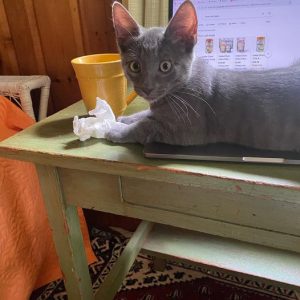 The dreaded question, “How’s your book selling?” invariably sends me into a spiral of self-doubt. But I’m not the only writer who doesn’t make much, if any money, from her books. According to a recent New York Times article “Writing has never been a lucrative career choice, but a recent study by the Authors Guild … shows that it may not even be a livable one anymore.”
The dreaded question, “How’s your book selling?” invariably sends me into a spiral of self-doubt. But I’m not the only writer who doesn’t make much, if any money, from her books. According to a recent New York Times article “Writing has never been a lucrative career choice, but a recent study by the Authors Guild … shows that it may not even be a livable one anymore.”
That Authors Guild 2017 Survey found that “full-time book authors still only earned a median income of $20,300, well below the federal poverty line for a family of three or more.” When part-time writers are factored in the number drops to $6,080, a sharp decline over the last decade that underscores the new reality that writers often must juggle one or more jobs to make ends meet.
Day jobs are sometimes characterized as soul-crushing, time-sucking places where creativity goes to die, but that doesn’t have to be the case. I spoke with alumni of Grub Street’s Novel Incubator about the ways they balance their day jobs with their writing.
Many writers make a living by writing something other than fiction.
Tracey Palmer, whose novel, I Never Needed You Anyway, was a finalist in the 2018 Writer’s League of Texas Manuscript Contest, finds her work as a freelance writer, editor and project manager “uses a completely different part of my brain than writing fiction does. Sometimes it’s really hard to switch between them … But even if I’m slacking off on working on my book, at least I’m still always writing!”
Shalene Gupta is writing a YA novel but writes about business for her day job and does “freelance writing on e-commerce/fintech and sports journalism/book reviews.”
Laura Roper, meanwhile, uses her narrative skills to make the reports she writes for her job in international development more interesting, but “there are times when the work completely takes over, times when taking a Saturday off for fiction is a useful respite and then the time between intense contracts where I can focus on the fiction. The ‘write every day’ mantra just doesn’t work for me… or rather, if professional writing counts, I guess it does.”
Writing for a living while writing a novel doesn’t work for everyone.
Mark Guerin tried writing when he was working full-time but “found that work side-tracked me so often that whenever I came back to my book, I found myself taking it in new directions every time. Eventually, it became so fragmented, it was like I had three books instead of one. Very hard to keep on track. It was only once I retired that my writing gained the necessary focus.”
Flexibility in a day job helps.
Andrea Meyer, author of Room for Love, appreciates the flexibility provided by her job running “the virtual office for a membership organization called UFVA (University Film & Video Association)” because she “can do it any time from anywhere, even in front of the TV at night, leaving my days free for writing.”
Belle Brett, who worked full-time while writing her recently published novel, Gina in the Floating World, notes that “I was self-employed, which gave me flexibility and no one peering over my shoulder to see what I was doing.”
But flexibility doesn’t always help.
Bonnie Waltch is working on her YA novel Finding Black Jaguar and is a producer and writer of media for museum exhibits and one feature-length documentary. She says, “I’m a freelancer, so have some control over my time … but I feel like I can’t turn down work, so I have periods, sometimes a whole year, when I’m way too busy to work on my own writing.”
Some writers write on the job (ssshhhh).
Sharissa Jones, who wrote her first novel while a partner at a private equity fund, admits “I kept a notebook by my telephone and every time some guy was mansplaining on a conference call, I just thought about my book and made notes. I wrote into a voice recorder while I walked to work or commuted to a meeting … Not ideal, for sure,” she notes, adding, “But I’d grown up really poor and knew that I couldn’t be creative with financial pressure hanging over me and my family.”
Leslie Teel, who is writing a YA suspense novel, says her job is “pretty much the same story as everyone else who works full time. Write when you can and try not to get caught writing at work!”
Some writers derive creative inspiration from their day jobs.
Cara Wood writes full time at her day job about eCommerce and technology trends and indicates that this “probably explains why the genre I tend towards is speculative fiction.”
Jennifer Johnson, who is working on a YA novel, teaches elementary school and gets “handed great lines for dialogue on the daily. Just this week: 1) ‘Ms. Johnson—I’m going to fart to see if it comes out wet.’ 2) ‘Ms. Johnson, did you ride your unicorn to school today? I rode mine and it went very, very fast.'” She “gifts all of these gems to anyone who might use them.”
Michelle Hoover, author of The Quickening and Bottomland, teaches in the Novel Incubator program and at Brandeis University, but looking to the future she “always thought if my academic career didn’t pan out, I’d turn to bartending. Brainless, exhausting in a different way, and fodder for stories.”
Jobs that are completely different from writing have pros and cons.
Kate Murphy works full time as an accountant and has a side gig at a restaurant on weekends. For her, “my profession is so different from writing that it uses a different type of thinking/energy so I can write at night, or before work and on lunch breaks. Another pro is that it provides a natural time crunch.” Even so, “it is exhausting!”
Personally, I like to believe years of debugging programs while working in IT honed my mystery writing skills. Working in tech also provided the blessing of financial security. Cons: Sometimes I had to work nights and weekends, though I did manage to slip some writing in while on 24-hour conference calls with my phone on mute.
Some writers are lucky enough to be supported!
Nancy Crochiere used to do freelance publishing work but says “now I just have a sugar daddy. Well, a gainfully employed husband.”
For others the financial pressures of making a living while writing can be overwhelming.
Pam Loring does whatever she can to “cobble together a livelihood” that gives her the freedom to write, including book editing, corporate writing gigs, personal assistant work, and even “running a flower stand” each summer. She reflects that “sometimes I work so much for so little that I … wonder how I ever imagined working for myself would allow me chunks of time to write, but somehow, sometimes, it does … I may be poor and struggling, and drowning in a sea of rejections, but at least I’m trying to be a writer, goddamn it.”
Amen.


Love this post. (And Jennifer Johnson, you’ve gotta gold mine there in your classroom. Wet farts and unicorns, oh my! )
From the mouths of kids to the keyboards of writers!
The Mansplaining Notebook: A story unto itself!!
Totally agree Michelle. I’m dying to know more!
Great piece. It’s nice to see how others in our community are spending their days! Thanks for linking to my book!
Thanks, Emily. It’s always good to talk about the practicalities of the writing life! Sometimes I look back and wonder how I did manage to do it all–the “if you want something done, give it to a busy person” trope, but even as a retired person, there still aren’t enough hours in the day, especially when one is on a deadline-oriented book marketing schedule!
I loved this! It’s so great to see what other people are doing!